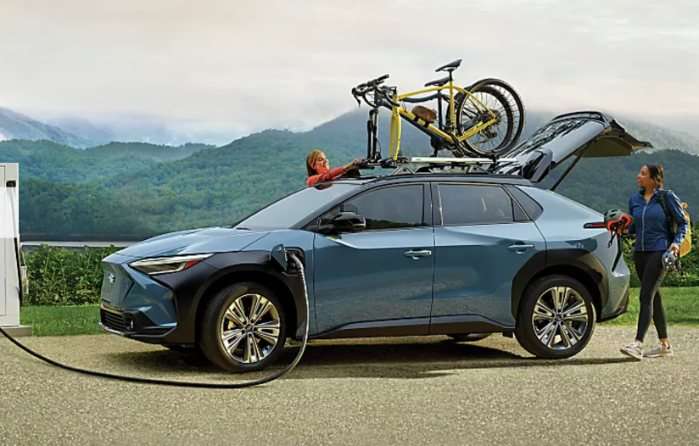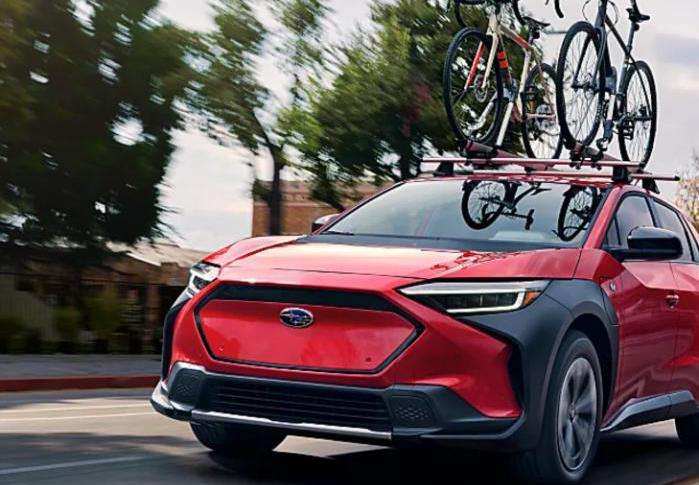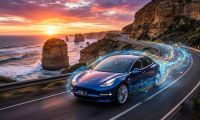Are you considering buying an electric vehicle like the 2023 Subaru Solterra? It would be best to wait before purchasing an EV if you are uncertain. A 2023 Subaru Forester compact SUV or Outback midsize SUV is a better option now. Check out the new report from the Anderson Economic Group data before you buy a new electric vehicle.
The recent report from Automotive News (by subscription) says the cost to drive a gas engine vehicle 100 miles in the U.S. fell below the cost to charge a comparable electric car for the first time in 18 months, the Michigan think tank says.

The report was based on gas prices late last year. The Anderson Economic Group says mid-priced gas engine owners are paying about $11.29 for 100 miles of driving, an average of 31 cents less than mid-priced EV drivers who charge at home.
The switch results in fuel costs dropping by over $2 and falling below upward trending home-charging costs, AEG explained.

With the latest EV general ownership costs nearly matching those of gas engine vehicles, brand-specific EV price cuts, and federal EV tax credits also changing the cost conversation, this upset in affordability is the latest update in cost comparison metrics between electric vehicles and gasoline-powered vehicles.
"The run-up in gas prices made EVs look like a bargain during much of 2021 and 2022," AEG's Patrick Anderson said. "With electric prices going up and gas prices declining, drivers of traditional gas vehicles saved a little bit of money in the last quarter of 2022."
Should you buy an all-electric 2023 Subaru Solterra compact SUV or a 2023 Subaru Forester?
When you compare pricing, it's an easy decision right now. The affordability could change if gas prices rise.
What is the price of a 2023 Subaru Forester?
All 2023 Forester trim levels increased by $550 in price, including destination and delivery. The 2023 Forester comes in six trim levels; The Base Forester starts at $27,620, Premium ($30,620), Sport ($32,190), Limited ($34,300), Wilderness ($35,245), and Touring ($37,720). Pricing includes dealer fees ($1,225).
What is the price of the 2023 Subaru Solterra EV?
The 2023 Solterra is offered in Premium, Limited, and Touring. Pricing for the Solterra Premium trim level starts at $46,220. The Limited trim carries a starting manufacturer's suggested retail price of $49,720. The top-of-the-line Touring trim is priced at $53,220. Prices include destination and delivery fees ($1,225). Subaru says U.S. retailers set the actual price and may charge more.
With gas prices staying at about $3.42 as of this writing, it's cheaper to fill up a 2023 Subaru Forester all-wheel-drive vehicle than the cost of charging an electric SUV like the 2023 Solterra and other new comparable battery electric vehicles, according to the Anderson Economic Group's report. EV enthusiasts won't be happy with this news.
Keep in mind this report is not a debate about reducing greenhouse gases and EVs contributing to a cleaner environment. It's only considering the cost of fueling a gas-engine vehicle versus charging an electric car. So please don't send us any hate mail. We just report the facts. We would like to hear your thoughts on the issue in the comment section.
You Might Also Like: Subaru Issues Solterra EV 'Do Not Drive' Warning, Says the Wheel Problem Is Still Not Fixed
Denis Flierl has invested over 30 years in the automotive industry in a consulting role working with every major car brand. He is an accredited member of the Rocky Mountain Automotive Press. Check out Subaru Report, where he covers all of the Japanese automaker's models. More stories can be found on the Torque News Subaru page. Follow Denis on Facebook, Twitter, and Instagram.
Subaru Report - We’ve got you covered! Check back tomorrow for more unique, informative SUBARU news, reviews, and previews you can trust.
Leave your comments below, share the article with friends, and tweet it out to your followers!
Photo credit: Subaru
Set Torque News as Preferred Source on Google












Comments
Great story, Denis. My
Permalink
Great story, Denis. My vehicle testing leans heavily toward EVs. In Metro West Boston, it costs more to charge in public at many of the places I visit than it does to power a 30 MPG-ish vehicle like a Forester. At home, my electricity, even with special discount programs, costs me $0.34/kWh. I like to break it all down to cost per mile. Much simpler. There are certainly some places where electricity is cheap. But not in my affluent and EV-friendly state. Hybrids are the least expensive to power.
It would be nice to know the
Permalink
It would be nice to know the assumption s and calculations used to get at this. Because, from what I calculate -
$12.00 to fill up for 100 miles of gas driving (rounded up from article).
Assuming even a very high electric rate of $0.40 / kwh
That's $12.00 / $0.40 = 30 kwh of power charge.
Inefficient EV vehicles get 4-5 miles per kwh. So even the low range of 4 miles per kwh = 120 miles of charge for the same price as gas.
So, something isn't adding up to what the article implies. And that is using conservative estimates (my electric rate is <$0.20 / kwh for example).
I suspect they are using data
Permalink
In reply to It would be nice to know the by Chris (not verified)
I suspect they are using data from England.
Hydro rates over there are something insane like £0.60/Kwh. Because your right, nobody I know is paying electric rates even slightly close to what this article implies
Very interesting! But
Permalink
Very interesting! But breaking this down a bit… though it depends entirely on how one drives and which EV we are talking about and of course the price per kWh… but an efficient EV like a model 3 can easily get over 4 miles per kWh average and a bigger less aerodynamic or more aggressively driven (or perhaps towing) EV can get 2 miles oer kWh or less. Let’s just use 3.5 miles per kWh as the average. Electricity prices vary widely and John gave a high end example in the Boston area of .34 cents/kWh. It is about 9 cents per kWh here in Seattle area and the average price in the U.S now is a little over .16 cents/kWh. Using these averages you get a cost of about $4.60 to drive 100 miles on electricity. Lower it to 3 miles per kWh and raise price to .26 cents/kWh and it is $8.67 for 100 miles. Not until you get to .35 cents and 3 miles per kWh, do you pay more for 100 EV miles. So I would say SOME (and most likely a minority) of drivers in the U.S. would pay more in “fuel” costs to drive an EV, but most would likely pay a little to a lot less. Of course in places where gas is cheaper, or electricity much higher, the calculus is different. I don’t have access to the source article, but would be interested to know if they broke down the costs and miles per kWh info in any detail.
I just bought a 2020 Forester
Permalink
I just bought a 2020 Forester. On flat highway driving with cruise control set @ 65mph, it recently got 43mpg; (my usual all-in mpg is ~32). At $3.+/gal cost, it's about 8-10 cents/mile. I don't know how that translates to equivalent $/kWh, but I'll wager it's cheaper.
3-4 miles per KWH, figure out
Permalink
In reply to I just bought a 2020 Forester by Brownheath (not verified)
3-4 miles per KWH, figure out your electric rate at home. Likely about 3X more expensive to drive your outback
Wisconsin is between .13
Permalink
Wisconsin is between .13 cents a kwh and .09 so take this think tank with a grain of salt.
Probably makes sense to
Permalink
Probably makes sense to compare all out of pocket costs after purchasing the two vehicles to achieve an apples-to-apples comparison since the EV won't need any maintenance until the tires, breaks, and air filters need changing, while the gas car also requires regular oil and filter changes. Thus likely reduces the 5 year cost of ownership breakeven point so much that gasoline could drop much further
Yes, unfortunately commercial
Permalink
Yes, unfortunately commercial charging will be close to the equivalent of good mileage ICE car. Home charging will always be a better deal- just like preparing a meal at home is cheaper than eating at a restaurant. There are many free charging alternatives while shopping or dining out (but usually L2). Cheap fuel is not the only benefit of EVs
This report I believe is only
Permalink
This report I believe is only talking about public chargers that you pay a company to charge there. If you charge at home, and you will 99% of the time, depending on the state, it could cost half of what you are paying for gas. And don't forget that electric utility prices are much more stable than gas prices, meaning I know how much it's going to cost me to fill up for the year, when gas prices change by the day, sometimes drastically. Gas prices always go up in the long term while utilities are paying less for new capacity. Finally, if you live in a high cost electric market, adding solar can drop your costs greatly.
Everyone's getting this wrong
Permalink
Everyone's getting this wrong. People are going to charge their EVs at their house 90% to 95% of the time. My little Nissan leaf adds about $20 a month to my power bill in Eastern US. I average about 10,000 miles a year on that car driving it the way most Americans drive on 10 to 15 mi trips at a time.
Let's go really simple here.
Permalink
Let's go really simple here. Why would I buy a car that is worth less and spend more running it to save a few dollars. In the end if I go with the ev I will have paid less in running costs and have a car that is worth more. In the end I have more equity saved and have not burned fossil fuel myself commuting...
And where I'm at it's already
Permalink
In reply to Let's go really simple here. by oc0544 (not verified)
And where I'm at it's already over 4 bucks a gallon again. So the article is wrong.